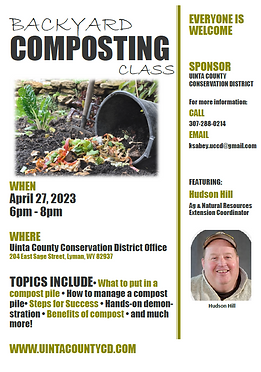HOME COMPOSTING
UCCD encourages urban conservation efforts by providing educational resources to help residents implement at-home composting strategies. Home composting is an excellent way to save money on trash disposal by recycling organic kitchen and garden waste into a useful soil amendment that can benefit your lawn and garden.
EDUCATIONAL RESOURCES
Compost for Lawns - Dirt Works Wyoming
Put compost on in October and noticed a striking difference in the grass color and growth in April the next year... Read Full Article
%20-%20Copy.png)
Everything about Compost for Lawn - The Grass Outlet
A comprehensive guide on how and why to use compost for lawn care.... Read Full Article
.png)
Building Healthy Soil in the Garden - Dirt Works Wyoming
With healthy soil, we can grow more food with less work... Read Full Article
%20-%20Copy.png)
What Makes Quality Compost? - Dirt Works Wyoming
Not all compost is created equal... Read Full Article
%20-%20Copy.png)
Backyard Composting - University of Wyoming Extension
Backyard Composting Using Simple, Small-scale Methods! Read Full Article

For over two decades, Recycling Connections has provided residents with information and resources on backyard composting. Including recorded video presentations on "COMPOST: it makes plants happy", and "Preparing your compost for winter"... Visit Webpage
.png)
Home Composting Basics - Institute for Local Self-Reliance
What Why and How of home composting. Plus many more resources! Read Full Article
.png)
18 Cool DIY Compost Bin Designs - CompostGuide.com
Building your own DIY composter is an easy way to save money on garden supplies and keep materials out of the landfill. Many DIY compost bins can be created from typical household items, making them extremely affordable... Read Full Article

UWyo Extension Composting Resources - Barnyards & Backyards
Many COMPOSTING RESOURCES provided by the University of Wyoming Extension can be found on the BARNYARDS & BACKYARDS resource page.

DIY Wire Fencing Compost Bin - Boston Recycling
Build Your Own Outdoor Compost Bin. A cost-effective way to build your own compost bin using welded wire fencing. View PDF
.png)
UCCD Composting Workshop 4/27/23
Summary
Some good information about composting was presented by Hudson Hill on April 27th!
Hudson is an extension educator for the University of Wyoming. During the workshop, he referred to the following UW Extension publication on backyard composting in Wyoming!
In a nutshell:
Start your compost pile with 25:1 brown to green organic matter.
You can add anything that was once alive but is now dead (although meat, bones, and human/dog/cat feces are not recommended).
Your compost pile should invite millions of microbes that, like all pets, need food, water, and exercise!
Food: organic matter, green and brown.
Water: your pile should be wet enough to feel icky but not stick to your hands.
Exercise: turn/stir your pile once per week!
Your pile should be warm and steamy. It should not stick to your hands or be soaking in water!

Mushrooms growing inside compost bin
COMPOST BIN - Urban Conservation Program
UCCD is offering a limited number of home compost bins at low cost to
Uinta County Residents
As of May 2024, all our compost bins and kitchen pails are sold out.
HOWEVER,
if you are interested in in purchasing a
compost bin or a kitchen pail, please contact us.
If there is enough interest, we will order more
bins and pails for the spring of 2025.
Please call us at
307-787-3070, (M-Th 8-4)
To help Uinta County residents establish composting habits in their yards, UCCD has partnered with Recycling Connections Corporation of Wisconsin to offer a limited number Home Composter™ bins at low cost.
The Home Composter™ bin
-
large 125-gallon capacity
-
made of 100% recycled plastic
-
wide opening to view & manage materials easily
-
sliding doors on each side for easy removal of finished compost
-
ventilation for excellent air flow
-
lockable lid deters rodents & other animal pests
-
two-piece construction allows for easy transportation & turning of materials
-
approx. dimensions: 30" tall, 33" wide
Comparison Chart: Home Composter™ vs. other composters on the market.
Compost Basics: Composting handout by Recycling Connections.
Composting Poster: Recycling Connections
.png)
Home Composter™ Bins
are now available to
Uinta County residents
on a first come first serve basis
while supplies last.
Limit 1 composter bin per household. All sales will be final.
Compost bins will be sold to Uinta County residents on a first come first serve basis while supplies last.
Items must be picked up from the UCCD office at 204 East Sage St., in Lyman.
SOLD OUT
If you are interested in purchasing a bin, please call us at
307-787-3070, (M-Th 8-4)
As of May 7, 2024, all the compost bins and kitchen pails are sold out.
HOWEVER,
if you are interested in in purchasing a
compost bin or a kitchen pail, please contact us.
If there is enough interest, we will order more
bins and pails for the spring of 2025.
We are also offering a
Kitchen Katcher stainless steel pail.

Attractive enough to store on your kitchen counter, small enough to fit under your sink.
Easy to clean, dishwasher safe.
Resists odors & stains.
Works great to collect food scraps for composting in your bin outside.
9" in diameter
7.5" high
1.25 gal capacity
Stainless steel
SOLD OUT


.png)
.png)
.png)